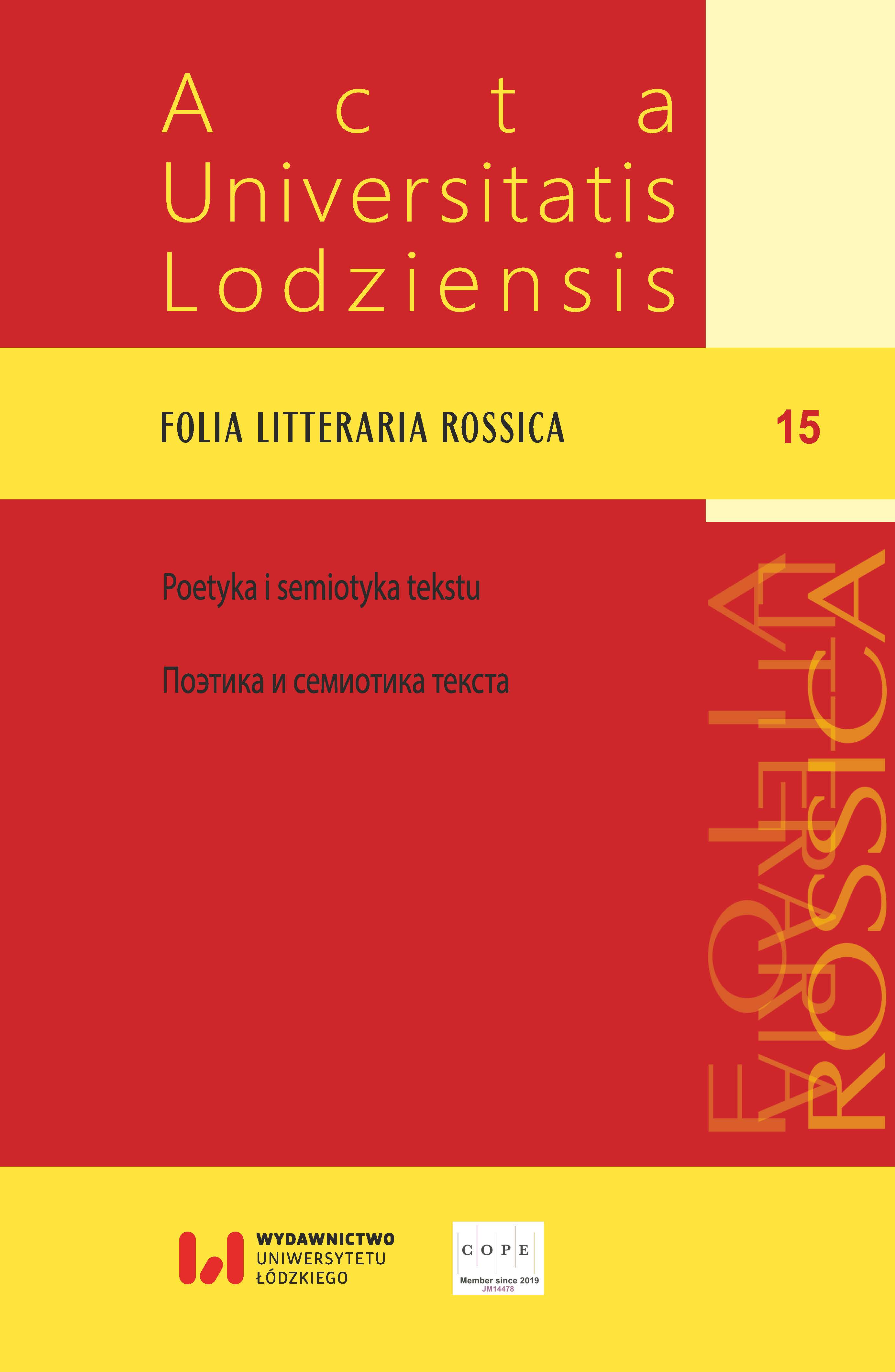A Dark-skinned Muse (Ending): An Instrument of Individual Destruction
DOI:
https://doi.org/10.18778/1427-9681.15.19Keywords:
musician tool, metaphor, Ivan Barkov, Anton Delvig, Konstantin Batyushkov, balalaikaAbstract
This article is the end of the study, the first part of which – “A dark-skinned muse: A duel in the steppe” – was published in “Acta Universitatis Lodziensis. Folia Litteraria Rossica”, No. 14 (2021). An analysis of the scene of Pushkin’s “duel” with a Kalmyk woman he met during a trip to Arzrum revealed the literary basis for describing the incident in the kibitka. The final part of the study is devoted to the literary and folklore genesis of the image of the “Musikian tool like our balalaika”, which the proud beauty allegedly hit on the head of the traveller who tried to kiss her. The “tool” as such was most likely present in the kibitka, but was hardly used as a weapon. Nevertheless, the blow, and a very sensitive one, was indeed struck, but not literally, but figuratively. The “Musikian tool” turns out to be a metaphor for a beauty that struck the poet’s imagination. The representation of a woman/a female body in the form of a musical instrument is often found in both folklore and literary texts. For example, O. de Balzac used this metaphor in La Physiologie du mariage (1829), and Pushkin himself used it in a drawing in Ushakov’s album in the winter of 1829–1830. For the first time, Pushkin used this metaphor in the poem “Gorodok” (1815), telling about a certain Antoshka who broke a balalaika playing, clearly focusing at the same time on the work of Ivan Barkov, who repeatedly depicted the female body as a musical instrument, in particular a balalaika or a violin, and copulation – playing on it.
Along the way, it was possible to establish that Antoshka from “Gorodok” is most likely a friendly caricature of Anton Delvig, who blamed his lyre for poetic impotence and threatened to break it. At the same time, the failed creative act ends with a fall from the Pind forehead to the bottom.
Downloads
References
Avtamonov, Ya. A. “Simvolika rastenii v velikorusskikh pesnyakh”. Zhurnal Ministerstva narodnogo prosveshcheniya. No. СССХХХХIV (1902): 277–279.
Google Scholar
Balzaс, Honoré de. Melkie nepriyatnosti supruzheskoi zhizni. Fiziologiya braka, transl. V. A. Milchina. Moskva: Novoe literaturnoe obozrenie, 2017.
Google Scholar
Chernov, Andrei. “Na tainye listy...” (Iz nablyudenii nad tekstom “Evgeniya Onegina”). In: Solntse russkoi poezii. Moskva: Pravda, 1989: 206–222.
Google Scholar
Delvau, Alfred. Dictionnaire erotique moderne. Nouvelle edition revue, corrigee, considerablement au mentee par l’auteur et enrichie de nombreuses citations. Paris: La Bibliotheque Privce, 1969.
Google Scholar
Dmitrieva, Svetlana I. Folklor i narodnoe iskusstvo russkikh Evropeiskogo Severa. Moskva: Nauka, 1988.
Google Scholar
Kabakova, Galina I. Antropologiya zhenskogo tela v slavyanskoi traditsii. Moskva: Nauchno-izdatelskii tsentr Ladomir, 2001.
Google Scholar
Koshelev, Vyacheslav A. Konstantin Batyushkov. Stranstviya i strasti. Moskva: Sovremennik, 1987.
Google Scholar
Kulagina, Alla. Chastushki v sovremennykh zapisyakh. In: Russkii eroticheskii folklor. Pesni. Obryady i obryadovyi folklor. Narodnyi teatr. Zagovory. Zagadki. Chastushki, ed. A. Toporkov. Moskva: Nauchno-izdatelskii tsentr Ladomir, 1995.
Google Scholar
Narezhnyi, Vasilii T. Sochineniya: v 2 t. Vol. 2. Moskva: Khudozhestvennaya literatura, 1983.
Google Scholar
Podyukov, Ivan. Zagadki iz folklornogo arkhiva MGU. In: Russkii eroticheskii folklor. Pesni. Obryady i obryadovyi folklor. Narodnyi teatr. Zagovory. Zagadki. Chastushki, ed. A. Toporkov. Moskva:Nauchno-izdatelskii tsentr Ladomir, 1995.
Google Scholar
Proskurin, Oleg. Literaturnye skandaly pushkinskoi epokhi. Moskva: OGI, 2000.
Google Scholar
Proskurin, Oleg. Poeziya Pushkina, ili Podvizhnyi palimpsest. Moskva: Novoe literaturnoe obozrenie, 1999.
Google Scholar
Pushkin, Aleksandr. S. Dnevniki. Zapiski. Sankt-Peterburg: Nauka, 1995.
Google Scholar
Russkii eroticheskii folklor. Pesni. Obryady i obryadovyi folklor. Narodnyi teatr. Zagovory. Zagadki. Chastushki, ed. A. Toporkov. Moskva: Nauchno-izdatelskii tsentr Ladomir, 1995.
Google Scholar
Shapir, Maksim. Iz istorii “parodicheskogo balladnogo stikha”. 1. Perom vladeet kak eldoi. In: Anti-mir russkoi kultury: Yazyk. Folklor. Literatura, ed. N. Bogomolov. Moskva: Nauchno-izdatelskii tsentrLadomir,
Google Scholar
Shruba, Manfred. “Barkov i Maikov”. Novoe literaturnoe obozrenie. No. 14 (1996): 143.
Google Scholar
Slovar Akademii Rossiiskoi, po azbuchnomu poryadku raspolozhennyi. Sankt-Peterburg, 1806.Slovar yazyka Pushkina: v 4 t. Vol. 2. Moskva: Azbukovnik, 2004.
Google Scholar
Uspenskii, Gavriil P. Opyt povestvovaniya o drevnostyakh russkikh. Kharkov: v Universitetskoi tip., 1818.
Google Scholar
Vatsuro, Vadim E. Zapiski komentatora. Sankt-Peterburg: Akademicheskii proekt, 1994.
Google Scholar
Vlasova, Zoya I. Skomorokhi i folklor. Sankt-Peterburg: Aleteiya, 2001.
Google Scholar
Downloads
Published
How to Cite
Issue
Section
License

This work is licensed under a Creative Commons Attribution-NonCommercial-NoDerivatives 4.0 International License.












